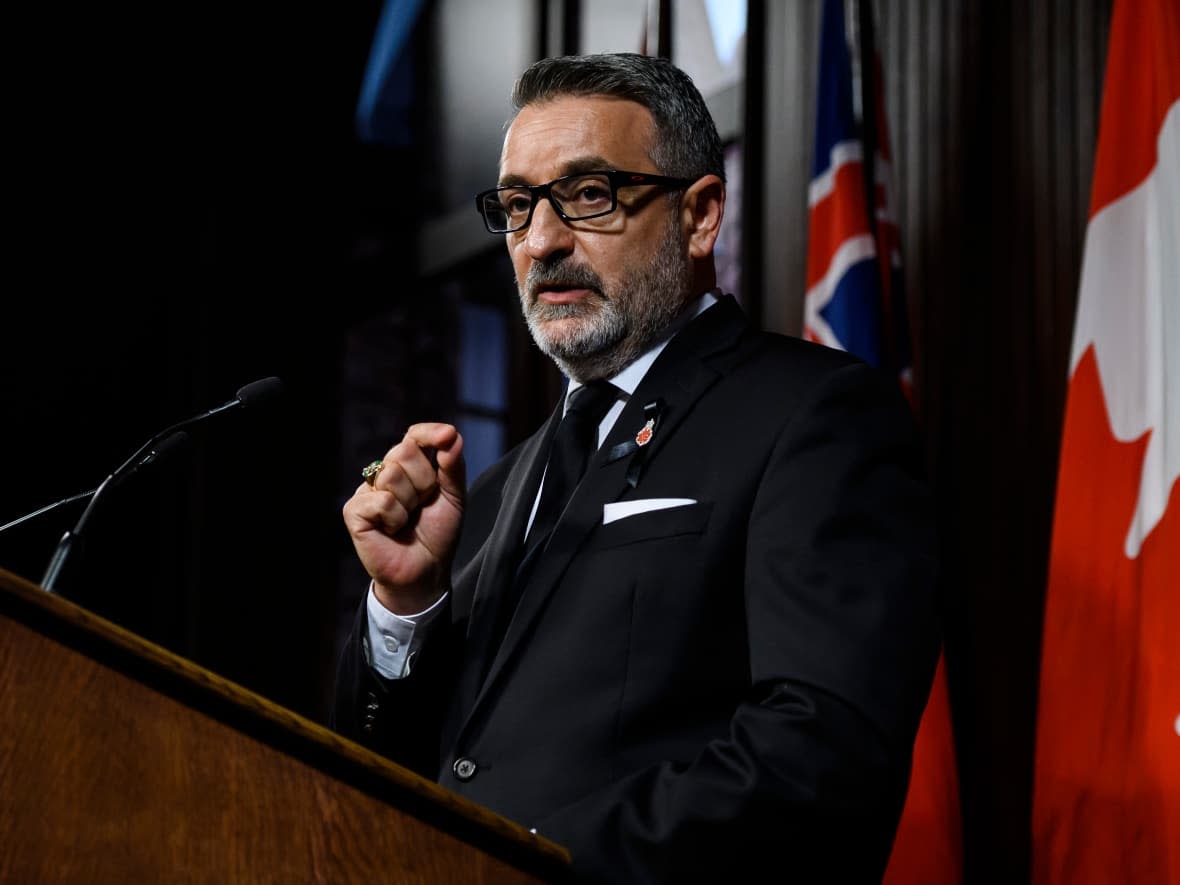Ontario LTC minister to review new national standards critics say can help boost care

Critics and advocates say newly-released national standards for long-term care homes can help improve care in the province, but Ontario's long-term care minister has stopped short of endorsing them, saying he'll take a look at what those standards entail.
At a news conference Tuesday, Paul Calandra said while he's still in the process of reviewing the national standards, he has no interest in implementing anything that will "water down" what the province is already doing to improve care.
"I suspect Ontario will still have the highest standards in Canada," said Calandra, after making an announcement about speeding up diagnostic testing for long-term care residents.
"I'm uninterested in any guideline that would water down the very high standards that Ontario has put in place with the Fixing Long Term Care Act."
The act was introduced and passed in 2021. The legislation followed a military report published in 2020 after Canadian Armed Forces teams were deployed to seven long-term care homes in Ontario. It included accounts of aggressive feeding that caused choking, bleeding infections and residents crying for help for hours.
Calandra did not specify in what way the national standards could "water down" Ontario's measures.
Provinces across the country are considering their next move after the release of a new report on national standards for long-term care home in Canada on Tuesday. While the standards are voluntary, health experts told CBC News they won't do the job unless long-term care homes adopt all of them without exceptions.
The new national standards go beyond pandemic preparedness and address everything from preventing falls and maintaining flexible meal schedules to end-of-life-care and emergency plans for catastrophic events.
They also include recommendations for flexible visitor policies, for rules that balance LTC residents' rights with the health and safety of others, and for minimal restrictions for essential caregivers to minimize resident isolation — along with page after page of standards for infection prevention and control.
The call for new standards for long-term care homes in Canada is part of Ottawa's attempt to avoid a repeat of the alarming death toll in LTC homes that marked the early phase of the pandemic.
The latest figures provided by the province from Jan. 26 show 100 Ontario long-term care homes dealing with COVID-19 outbreaks. An outbreak is declared when two or more lab-confirmed COVID-19 cases in a home are found.
At least 5,251 long-term care residents have died throughout the pandemic, dating back to April 2020.
Feds stopped 'just short of the finish line,' advocate says
Cathy Parkes lost her father Paul William Russell Parkes in Pickering's Orchard Villa — one of the homes visited by the military in the spring of 2020.
It was around that time she said advocates like her started to ask for nationally legislated standards because some provinces like Ontario were falling short of protecting LTC residents.
"Almost three years later and they've done it, but stopped just short of the finish line by not making it mandatory," said Parkes.

Parkes says said was disheartened to see the standards were voluntary, noting a whole generation will soon need to rely heavily on long-term care across the country.
She said she hopes no other families need to say goodbye to loved ones the way she did — separated by a dirty window because she wasn't allowed to visit.
"I don't want anyone to go through that."
Standards can 'complement' Ontario rules: lawyer
On Tuesday, Calandra said Ontario has some of the highest standards in the country, pointing to its move to provide an average of four hours of daily care for each resident by 2025, building or updating nearly 60,000 long-term care beds in Ontario and having "one of the highest" inspector-to-home ratios in North America.
Jane Meadus, a staff lawyer for the Advocacy Centre for the Elderly who also helped inform the new report, said while Ontario does have "fairly robust" legislation in the sector, the national standards are meant to "complement" what's already there.
Despite the strength of existing legislation, Meadus said Ontario falls short on enforcement. It's been a long-standing problem, and she said the centre continues to get complaints on non-compliant homes and the lack of inspection from the ministry.
And even if Ontario did implement the new care standards, she said there's still another beast to tackle: funding the sector to support the recommendations, and finding the staff to carry it out.
"That's nothing to do with the regulations, but it has to do with the way that the government works," said Meadus.

Meanwhile, some critics are taking aim at the high standards the Ford government says its striving for, saying they don't address disparate care outcomes between for-profit homes and non-profit ones.
Vivian Stamatopoulos, a long-term care advocate and associate professor at Ontario Tech University, said the four hours of care the Ford government is striving for aren't actually mandated upon individual homes but across the entire sector, meaning those performing well will skew the average hours of care upward.
"All it does is actually obfuscate and actually hide the worst performing LTCs," said Stamatopoulos.

 Yahoo Movies
Yahoo Movies 
